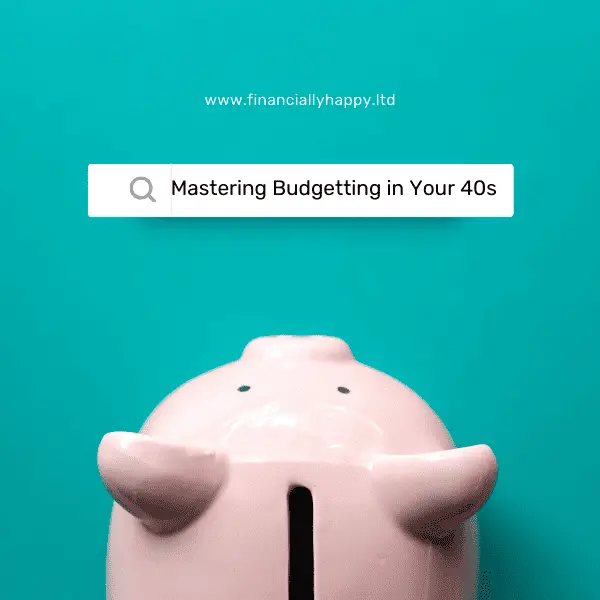Why do I worry about money when I have enough? 6 ways to stop worrying about money
Why Do I worry about money when I have enough? Good question.
Worrying and constantly thinking about money is all too common amongst nearly all household incomes.
There are a few reasons why you might worry about money even when you have enough. You’re used to worrying about money, and breaking that habit is hard. Or, it could be that you’re afraid of losing what you have or not having enough in the future.
Some people worry about money because they grew up in financially insecure families. This can make it challenging to feel secure in your finances, even when things are going well. Others may have experienced a significant financial setback at some point in their lives, making it difficult to feel confident about your financial situation.
Whatever the reason for your anxiety, there are some things you can do to ease your worries and start feeling more confident about your finances.
Whether six-figure salary plus or basic survival income levels, we all worry to some extent about money. With the endless questions, do we have enough?
Many of our money worries come from uncertainty around earning it, keeping it, growing and spending it.
What is the best way to make the most money in the least amount of time, balancing our interests, morals and motivations? One job might pay a massive salary but clearly clashes with how you see the world or makes you do things that are not worth the money.
What is the best way to grow your money other than not spending it? Should we save or invest and in what and when, and how?
How could we spend our money to get the maxim enjoyment out of it now and in the future? Without ending up in poverty now or in our old age.
But why worry about money when you think you have enough?
It’s because of the uncertainty of knowing how much is enough.
Table of Contents

Enough money but for what?
- to be mortgage-free
- to have a luxury yacht
- to send your children to university
- to take a year out (ideally travel but potentially just sit in your home – thanks COIVD)
- To retire at ….. (fill in your desired age)
- To make work optional ASAP and financially free.
All of these ideas and potentially many more all require us to figure out how much is enough.
If you have money left over at the end of the month, you might well have enough for the moment.
If you can grow the amount left over at the end of the month, then with time you might start to accumulate more than enough. If you keep growing that surplus, things like the above might come within your reach.
If you’re in the lucky position that you can already do any of the above or even all of the above you might well have enough. And yet still you’re worrying about money. Why is this?
Here are a few ways to stop worrying about money when you have enough.
1. Comparison is the root of all unhappiness

You might not know if you’ve got enough because you’re always looking at your neighbour/Instagram /Facebook friends who seem to have it all. Spending most of the time in the sun smiling, looking happy or at least happier than you.
How are they affording this? I thought they were broke? (their probably not affording it, they’re affording the payments or someone else is for them)
The key here is to run your race. Live your own life. Enjoy it the way that you want to enjoy it. Do your best not to compare yourself to other people’s highlight reels.
It’s not going to be comfortable looking at your friend’s endless holiday snaps, but you have to think is that they’ve got what you want. Or is it just what you think you want?
Being happy with what you have is the key to being comfortable with yourself and your financial situation.
It doesn’t mean that you have to give up on all the things that you would like. It just means that you should enjoy what you have right now while you work for the things you want in the future.
2. Know your numbers
If you know and check your numbers, then you should know if you’ve got enough. Being on top of your numbers, knowing where your money is and how much you have will have a calming effect on your money worries.
Tracking your income and expenditure will give you great clarity on where you sit financially, whether that’s good, bad, or ugly.
This knowledge will help you understand where you are right now and where you want to be if it’s not enough.
Shining a light on your finances will help you understand whether you need to be more careful with your money or not.
The more you can automate your finances, paying for things by direct debit using an app to track your money will all help with the day-to-day management of your money.
Let an app take the strain of categorising, tracking and reviewing where your money is going. Apps nowadays will help you understand if you are running a deficit and what income you are bringing in.
The easier the management becomes, the more time you have to concentrate on other things, and the less time you need to spend on admin or worry.
Automating your finances will play a massive part in reducing the stress and worry around your money. It will make the process much less labour intensive and prevent you from procrastinating as it’s all done for you at the touch of a button.
3. Avoid Lifestyle inflation

As you age, a widespread trait is slowly increasing your lifestyle.
Can you remember when you were younger, and a few pints and a bag of chips were all you needed for a good night out? Now you need a full sit-down three-course meal, wine, theatre and a taxi ride home just to feel normal.
The 40-inch TV now seems so small it has to be 60, if not 80. The brand-name clothes now need to be more exclusive. The once £10 haircut now has to be at least £30 (obviously, I’m talking about a man’s haircut here, at least double it for a woman’s)
Your lifestyle and the costs of meeting it make knowing how much is enough problematic.
If each year your costs keep going up it becomes more challenging to know how much you will need next year. Saving for it will be tricky, especially if your salary is not going up as fast.
Finding a comfortable lifestyle for you and sticking to it could be an essential way to worry less about money.
Removing this lifestyle uncertainty could help you understand that you have enough.
4. Avoid disaster, prevent or mitigate the worst happening

It may not be until shocks actually happen that you realise life is unpredictable and that things can go wrong that can’t be put back together that quickly.
Having a range of insurances in place can help prevent financial disasters or at least mitigate some of the worst effects.
Death is one of the most inconvenient things that can happen. It can leave those left behind with a financial hole that can’t easily be filled. Having life insurance in place can take away the worry of what would happen if the worst happens and how those left behind would be able to cope.
Illness is also an area where financial problems can occur. If you or a family member are taken ill and can no longer work for a period of time, this can spiral into financial difficulties due to the loss of income. You could lose two incomes, the ill person and the person who has to stop work to provide care.
Critical illness insurance can help mitigate the impact of this. It should pay out a lump sum to help cover the loss of income and care costs.
Income protection can also help deal with any periods out of work due to ill health by paying out a monthly amount for a set period of time while you recover.
Having this regular income while you could not work might well prevent you from spiralling into financial difficulties. The income protection will help you pay your ongoing bills while you recover.
Not having to worry about money while you are ill is highly likely to help with your recovery and Peace of Mind.
Having your own emergency fund of three to six months of expenses will give you immense Peace of Mind. Knowing that you can ride out many of the likely financial challenges, redundancy, major house or car repairs or a need to move from where you are due to separation.
I’m sure you likely have home, travel and car insurance so make sure you have also insured your most valuable asset, i.e. YOU and or your primary breadwinner.
5. It’s your parent’s fault (obviously)

Whatever your parent’s attitude was to money, it has likely played a big part in the way that you think about money whether that has been to adopt their mindset or rebel against it.
The question now is, how valuable are the money lessons that you learned from your parents?
Are there any that in retrospect, would be good for you to drop or adopt?
If they were penny pinchers, what are some of the advantages of this money management system and what are some of the disadvantages?
Could adopting a more frugal lifestyle help you worry less about money?
If they were big spenders, how would this attitude be helpful to you now?
Did they spend money on things or on experiences, and which do you remember being the most joyful for them and you?
Thinking about how you can incorporate the good things your parents did with money and leave out the bad things might help strengthen your own money management and mindset.
If you are a parent, your money habits and mindset are now imprinted on your kids. So how do you want them to view your money habits?
If your children can see you using your money to have more free time to spend with friends and family to enjoy good food and company then they might well have a positive view on how to manage their own money one day.
If your children see you live within your limits, they will realise that although this may be challenging it is a way not to spend all your time worrying about money.
6. Forgive yourself; that person is long gone

I’m sure when you were young and foolish, you were young and foolish but that person has now left or at least their good looks, and their slim figure probably has.
The money mistakes you may have made in the past are exactly that in the past, and you can learn from them and move on.
You are likely an older wiser person now. You can find most things on the Internet, or you can find a financial advisor or financial coach that can help answer your financial questions or problems.
Even better, you can learn from other people’s mistakes and therefore not do them in your own life.
If you feel you didn’t save enough in the past, you can change that now.
If you feel you have not really understood money enough in the past, you can change that now.
If you feel you have not used your money wisely in the past, you can change that now.
Forgive yourself for past money mistakes and move on to greener pastures. Start taking control of your finances, accepting where they could be better and begin making those changes today.
I’m sure you have seen friends or family or maybe even yourself what the impact of not saving enough is. Let this be your motivation to grow the gap between your income and expenditure and to use that money to make you feel more and more financially happy.
FAQ: Why do I worry about money when I have enough?
I have plenty of money but still, worry?
If you are worried about money even though you have plenty, it might be because you are unsure how long your wealth will last. While it is natural to worry about money, trying to keep your finances in perspective and not let your money worries consume you is essential. Here are a few things you can do to ease your money concerns.
-One way to ease your money worries is to keep track of your finances. This means knowing how much money you have coming in and going out. You can do this by creating a budget or tracking your spending. This will help you see where your money is going and if you’re happy with that.
-Another way is to create a plan of what you want to achieve in your life. This can include short-term and long-term goals. Once you have a plan, you can start to save or use your money for your goals.
-If you are still struggling with money worries, it may be helpful to talk to a financial coach, planner, or a good friend to help put things in perspective.talking to a financial coach, planner, or a good friend may
How to stop worrying about money?
1. Set some life and financial goals to make life exciting.
2. Track your finances so you know whats going on
3. Keep a budget so your money goes to where you want it to
4. Save money where you can
5. Spend less money so that you keep more of your money yours
6. Earn or create more in a job or business.
7. Get rid of debt is not helping you at all.
8. Automate as much as you can and get on with your life.
How to not worry about money?
There are a few things that you can do to not worry about money.
First, try to learn to live within your means. This means spending less than you make and saving up for future purchases instead of putting them on credit.
You may also want to create a budget to keep track of your spending and ensure that you are not overspending.
Another thing that can help is to develop a savings plan or find creative ways to make extra money. There are many ways to make money, so find something that works for you and start saving! Lastly, try not to focus on material possessions.
Instead, focus on experiences and relationships that will last much longer than any material item. If you follow these tips, you should be well on your way to financial success!
How to stop thinking about money?
There are a few things you can do to stop thinking about money.
One is to create a budget and stick to it. This will help you keep your spending in check and stop you from worrying about how you’re going to pay your bills each month.
Another thing you can do is start investing your money. This will help you grow your savings and earn interest on your money, which will help take the stress out of finances.
Finally, try not to compare yourself to others. It’s natural to want what others have, but it’s important to remember that everyone’s financial situation is different.
Focus on creating a financial plan that works for you, and don’t worry about what everyone else is doing.
How to worry less about money?
There’s no denying that money is a significant source of stress for many people. Worrying about money can lead to all sorts of problems, from relationship difficulties to health issues.
So, how can you worry less about money? Here are a few suggestions:
Track your spending. Knowing where your money is going can help you feel more in control of your finances and less worried about not having enough money.
Make a plan. If you’re worried about not having enough money, sit down and make a plan. Figure out what bills need to be paid and ensure you allocate funds toward them.
Get creative in ways to earn or generate more money. Use your skills and experience to make more money and create a bigger gap between you and financial insecurity.
How to stop worrying about money when you have enough?
To stop worrying about money when you have enough, consider implementing the following strategies:
Set a Budget and Stick to It: Knowing where your money is going can alleviate anxiety. Create a budget that accounts for your needs, wants, and savings.
Build an Emergency Fund: Having a safety net can reduce financial stress. Aim for three to six months’ worth of living expenses in a savings account.
Educate Yourself: Sometimes, worry comes from a lack of knowledge. Educate yourself about personal finance and investment to make informed decisions.
Set Financial Goals: Establish short-term and long-term financial goals. Knowing what you are working towards can provide a sense of purpose and control.
Avoid Comparisons: Social comparisons can exacerbate money worries. Focus on your own financial journey rather than comparing yourself to others.
Practice Gratitude: Regularly take stock of what you have and express gratitude. This can shift your focus from what you lack to what you possess.
Seek Professional Advice: Consult a financial planner or coach to ensure that your finances are in order and to get advice tailored to your situation.
Talk About It: Sometimes just talking about your worries can help. Share your concerns with a trusted friend or family member.
Practice Mindfulness and Stress-Reduction Techniques: Engage in activities such as meditation, exercise, or hobbies that help you relax and take your mind off financial worries.
Reevaluate Your Values and Priorities: Sometimes we worry because our spending doesn’t align with our values. Make sure your financial choices reflect what’s truly important to you.
Remember, it’s normal to have concerns about money, but taking proactive steps can help alleviate unnecessary worry when you have sufficient finances.
Final thoughts: I have plenty of money but still worry
Don’t spend your time comparing yourself to others think about your lifestyle and cash needs and work towards that. Don’t look at the Joneses and wish you had their lifestyle because you have no idea what’s beneath their financial bonnet.
Know your numbers and check them regularly. Automating your finances through your bank account or a financial app will help you keep up with your numbers. This way, you’ll understand where your money is going, and how much you have, and give you Peace of Mind to know you have enough.
Living within your means and keeping your lifestyle within those means will significantly help your financial Peace of Mind. Knowing that you are not stretching the boundaries of your finances with more and more lifestyle creep will again help you to know that you have enough to live a comfortable life.
You can avoid many financial disasters by putting in place a number of safety nets. Having a large emergency fund can help bridge any gaps in income. Having some insurance in place like life, critical illness, and or income protection can help with any income gaps or significant shocks. All of these will help you know that you should be able to cope or that those left behind should be able to manage.
Remember, your parents taught you some valuable financial lessons. Of course, they could have been good or bad lessons; it’s up to you to learn from those triumphs and failures and adapt to your circumstances. Thinking about how your financial habits imprint on your kids might help you improve your money habits. Like a good horror movie, your kids are always watching you, so make it look like you know what you are doing with your money.
Forgive yourself for past mistakes and learn from them. If it was a lack of knowledge, you could improve your financial education through books, podcasts and financial coaching if it was an unwise spending decision to review any future purchases with that in mind.
Remember what you thought when you bought the item, what it would bring you and what it did.
This might help you keep more money in your pocket (high-interest bank account).
Why do I worry about money when I have enough
| Worry area | Description |
|---|---|
| Comparison is the Root of All Unhappiness | Constantly comparing your financial status to others can lead to dissatisfaction. Focus on your own goals and achievements instead of measuring against others. |
| Know Your Numbers | Being aware of your financial situation, including income, expenses, and savings, can alleviate anxiety. Create a budget and track your spending. |
| Avoid Lifestyle Inflation | As your income increases, it’s easy to increase your spending proportionally. Be mindful of this and avoid unnecessary expenses to maintain financial stability. |
| Avoid Disaster, Prevent or Mitigate the Worst | Have a plan in place for unexpected financial challenges. Build an emergency fund and consider insurance to protect against unforeseen events. |
| It’s Your Parent’s Fault (Obviously) | Sometimes, our financial worries stem from beliefs and habits we inherited from our parents. Be aware of this and work on developing your own healthy habits. |
| Forgive Yourself; That Person is Long Gone | If past financial mistakes are causing worry, it’s important to forgive yourself. Learn from these experiences and focus on making better decisions moving forward. |
Anyway, those are my thoughts on “why do I worry about money when I have enough? Let me know yours in the comments below.
Are there any other ways you can think of to stop worrying about money?
Need a Helping Hand with Your Finances? 🤝💰
If you’ve made it this far, congratulations! You’re already taking steps towards a healthier financial future. But maybe you’re feeling a bit overwhelmed. Maybe the thought of budgeting, saving, and investing still makes you break out in a cold sweat. Don’t worry, you’re not alone, and help is available.
At Financially Happy Money Coaching, I understand that money isn’t just about numbers. It’s about emotions, behaviours, and life choices. That’s why we’re here to help you take the stress out of money and build wealth in a way that aligns with your values and lifestyle.
Whether you’re just starting out on your financial journey or you’re looking to take your finances to the next level, we’re here to guide you every step of the way. I’ll help you understand your financial behaviours, set realistic goals, and create a personalized plan to achieve those goals.
So, why wait? Start your journey towards financial happiness today. Remember, the best time to start was yesterday. The second best time is now.
Click here to schedule your consultation and let’s make your money work for you, not vice versa. 💪💰
Remember, financial freedom isn’t a destination; it’s a journey. And every journey is easier when you have a guide. So, let’s embark on this journey together and create a financially happy future. 🚀💸
📚 Financial Freedom Resources
- The Ultimate Guide To Building Your Savings to $100,000! 📘 is a transformative book that equips readers with principles, strategies, and the mindset 🧠 needed to reach a $100,000 savings goal 💰. It’s a journey towards financial freedom 🚀, challenging beliefs 🤔, embracing new habits 🔄, and overcoming obstacles 💪.
- How to Manage Your Finances: Your Guide to Financial Freedom 📘 is a comprehensive resource packed with practical advice on budgeting 💰, investing 📈, reducing debt 💳, and building wealth 💎. It’s an essential guide for anyone, novice or experienced, aiming to take control of their financial future and achieve financial independence 🚀.
- Mastering Budgeting in Your 40s: Your Guide to Financial Freedom 📘 is your essential roadmap to financial savvy. Packed with tips on budgeting 💰, investing 📈, and debt management 💳, it’s the perfect toolkit for anyone in their 40s looking to secure their financial future and sail towards independence 🚀.
Remember, self-study is a powerful tool for life and financial transformation. Happy reading! 🎉










